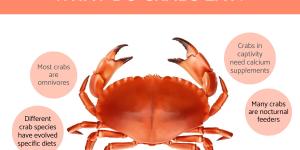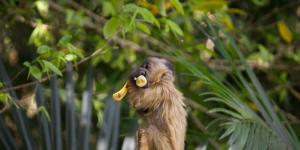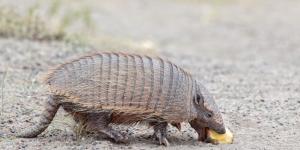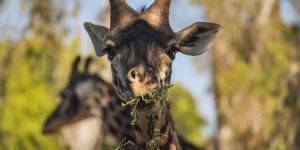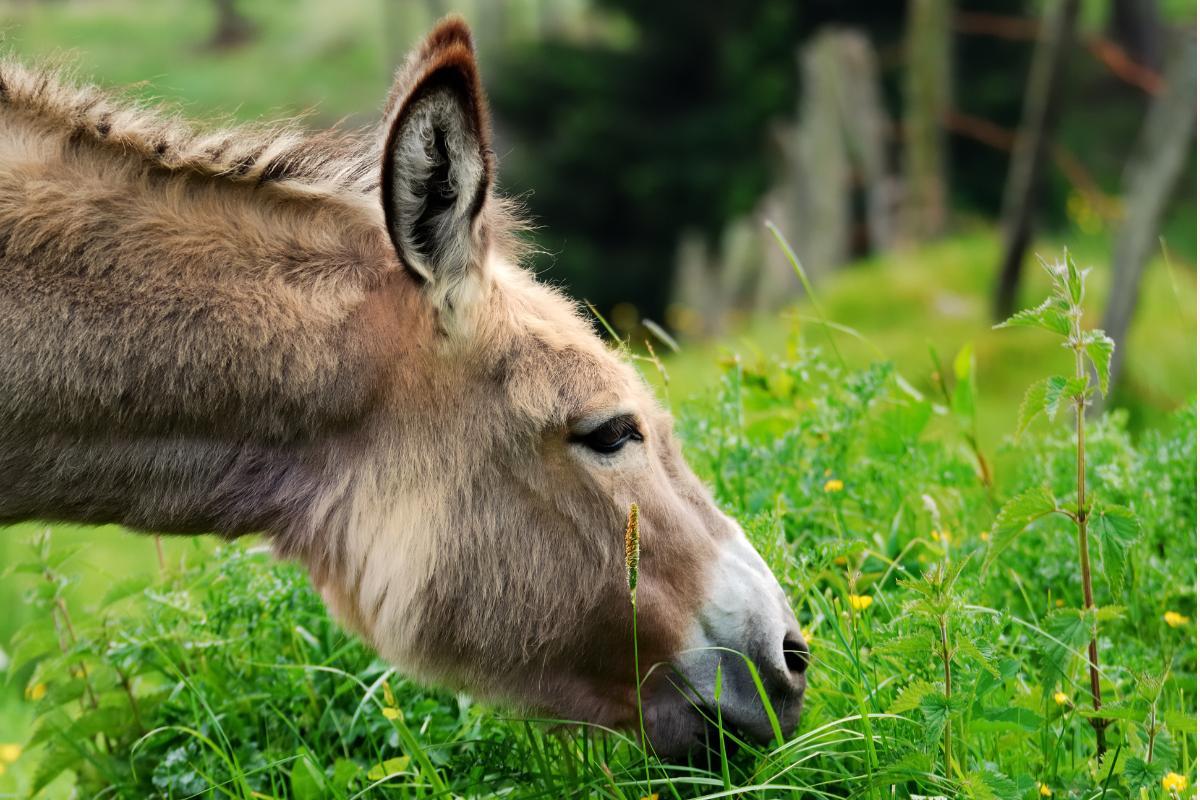What Do Donkeys Eat?


Donkeys are hardy and resilient animals that have been domesticated for thousands of years. As herbivores, they have unique dietary needs that require a balanced and nutritious diet to maintain good health and optimal performance. Donkeys are known for their ability to thrive in arid environments with limited food resources, but providing them with a diet that meets their nutritional requirements is essential.
In this AnimalWised article, we will explore what donkeys eat, their dietary needs and more.
Digestive system of donkeys
Donkeys may seem like ordinary herbivores, but their unique digestive system sets them apart from other animals. One of the main differences is in their ability to extract nutrients from fibrous plant material.
Donkeys have a slower rate of passage of food through the digestive tract, which allows for more thorough fermentation and better extraction of nutrients from their food. They also have a larger cecum and colon relative to their body size, which allows for more extensive fermentation of fibrous material.
Additionally, microorganisms in their digestive system further aid in breaking down low-quality or low-nutritious vegetation. Donkeys rely on their intestinal microbiota to maintain proper nutrition.
Not only is their digestive system efficient, but donkeys also possess specialized teeth to root and crush plants before they even reach their stomach. This unique adaptation allows for even greater efficiency in their digestion process.
In addition, donkeys have a unique adaptation in their small intestine known as the "jejunal-ileal bypass." This bypass diverts food from the first part of the small intestine, where carbohydrates and proteins are absorbed, to the second part of the small intestine, where fiber and fats are absorbed. This allows donkeys to better digest.
Donkeys are known for spending a good part of their day feeding, but interestingly enough, they consume less feed compared to other equines. They prefer small, frequent feedings throughout the day rather than a few larger meals. With this knowledge, we can better understand the dietary needs of these incredible animals.
We suggest you take a look at our other article, which provides an in-depth explanation of equines, their characteristics, and the features they have in common.
What do baby donkeys eat?
Baby donkeys, also known as foals, are mammals and rely on their mother's milk as their primary source of nutrition after birth. They start nursing shortly after being born, and establish strong bonds with their mothers that can last a lifetime.
Donkey milk is rich in fat, protein, and essential nutrients that help the foal grow and develop. As they get older and start to wean, they begin to eat solid food, such as hay, grass, and grains.
The weaning process of donkeys typically begins at 6-8 months of age and is completed by 12-14 months. During this time, the foal gradually transitions from a diet of solely mother's milk to solid foods. The process is often gradual, with the foal slowly reducing the amount of milk it drinks as it becomes more interested in eating solid foods.
To ensure proper development and minimize stress for both the foal and mother, it's crucial to keep baby donkeys, or foals, with their mothers until they are at least 8 months old. Foals rely on their mother's milk and guidance to thrive, and premature separation can disrupt the strong bond that donkeys establish with their mothers. Gradual weaning and separation is recommended to ease the transition for both the foal and mother.
You might be interested in this other video, where we explain how to tell if a donkey is pregnant.
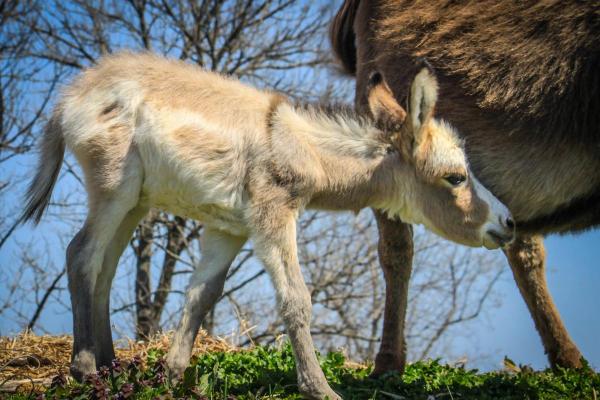
What do adult donkeys eat?
Donkeys have specific dietary requirements that differ from other equines, such as horses. For example, donkeys require a higher fiber diet due to their digestive system, which is adapted to consume roughage. They also have a lower protein requirement than horses, making them better suited for low protein forage.
In terms of minerals, donkeys require adequate levels of calcium, phosphorus, and sodium, as well as trace minerals such as copper, zinc, and selenium. These minerals are important for bone and muscle development, maintaining fluid balance, and supporting various metabolic functions.
The diet of adult donkeys can vary depending on the region and the availability of vegetation. These animals can obtain the necessary nutrients such as carbohydrates, proteins, fats, and vitamins from different plant sources.
The diet of donkeys should be well-balanced and consist of high-quality forage such as hay or pasture, along with small amounts of grains and supplements as needed.
Common foods for adult donkeys include:
- Barley or wheat straw
- Hay or dry fodder
- Legumes
- Alfalfa
- Oats
- Wheat and barley
- Grasses
- Herbs
- Salt supplements
In areas where vegetation is scarce, commercial foods and supplements designed for these animals can be offered, but it is critical to ensure their quality.
Access to fresh and clean water is essential for the health of these animals and must be available at all times.
While certain fruits and vegetables, like apples, bananas, and carrots, may be offered as a reward, they should not be a significant part of their diet. It is also essential to moderate the amount of barley, wheat, and oats that are given to donkeys. Providing a balanced and varied diet will ensure their health and well-being.

How much does a donkey eat a day?
The amount of food a donkey eats per day depends on several factors, such as its weight, age, activity level, and overall health.
On average, a healthy adult donkey weighing around 400-500 pounds (180-225 kg) may consume 1.5-2% of its body weight in hay or other forage per day. This means they may eat around 6-10 pounds (2.7-4.5 kg) of hay per day.
It's important to provide fresh water at all times and to avoid overfeeding, as obesity can lead to health problems in donkeys.
Do not miss this other article, where we explain the differences between a donkey, a mule, and an ass.
If you want to read similar articles to What Do Donkeys Eat?, we recommend you visit our Healthy diets category.
- They pay, R. (2022). Equus asinus . Animal Diversity Web. Available at: https://animaldiversity.org/accounts/Equus_asinus/
- Moehlman, P.D.; Kebede, F.; Yohannes, H. (2015). Equus africanus . The IUCN Red List of Threatened Species 2015. Available at: https://dx.doi.org/10.2305/IUCN.UK.2015-2.RLTS.T7949A45170994.en

